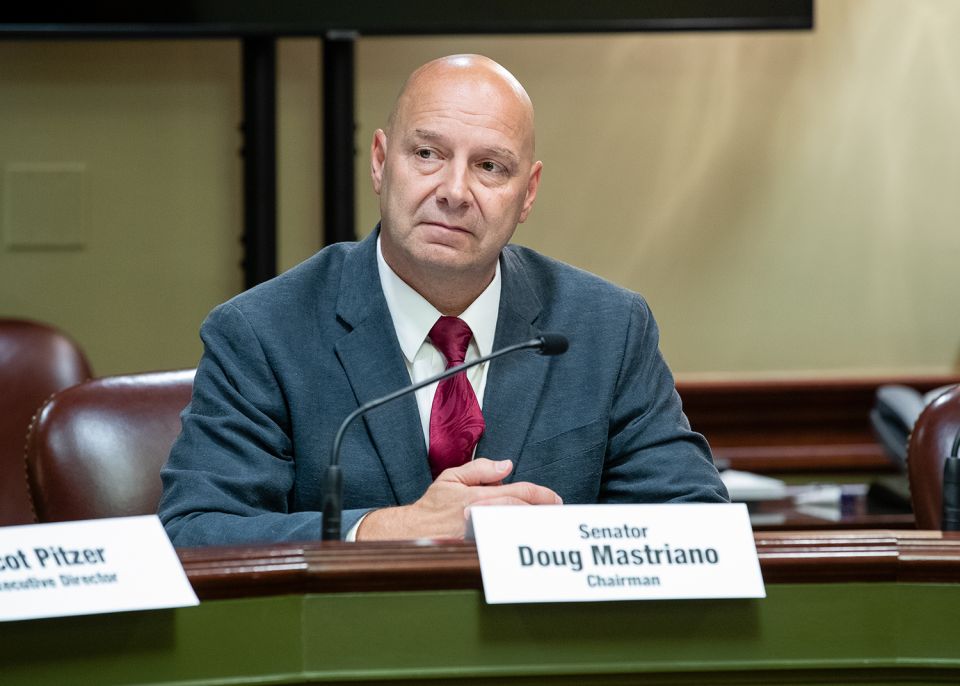Election Day 2024 offered no local surprises as conservative candidates easily swept three races for Pennsylvania House and Senate seats. Voters re-elected two Republicans to new terms in office, while a third conservative ran unopposed and won his first seat in Pennsylvania’s 90th District. Area voters also retained their Republican U.S. Congressman from the 13th District by an overwhelming margin.
However, in statewide races, Republicans also won the three major row offices contested, albeit by closer vote tallies, which reflected more parity in Pennsylvania’s Democrat and Republican party registries.
Doug Mastriano earned his second full four-year term as the 33rd District State Senator, easily defeating Democrat Cameron Schroy by an unofficial total of 69.2 percent to 30.8 percent. Challenger Schroy ran a spirited campaign to attract conservative voters to his progressive candidacy, but ultimately, Franklin and Adams County residents remained loyal to Mastriano.
A pair of Republicans were elected to two-year terms for two local Commonwealth House Districts. The average house district in Pennsylvania represents 64,000 residents.
In the Pennsylvania House 89th District, Republican incumbent Rob Kauffman was the victor over Democrat Noah Kreischer by an unofficial margin of 71.3 percent to 28.7 percent. Kauffman has occupied this office since 2004 and will serve his 11th term, representing Chambersburg and Guilford Township.
In the 90th District, conservative Chad Reichard prevailed in the Republican primary and ran without a challenger in the general election. Reichard is a Waynesboro native and has built a solid political resume, serving as a legislative aid to Congressman John Joyce and also as a zoning officer in Washington Township.
Reichard won the 90th seat with almost unanimous consent, enjoying strong support in a district representing his hometown borough, in addition to Greencastle, Mercersburg, Mont Alto and Washington/Quincy Townships.
In the U.S. House race for the 13th District, incumbent Republican John Joyce was the favorite in one of the state’s most conservative districts, as he ran against political newcomer Beth Farnham. The 13th District represents 11 counties in south central Pennsylvania, including Franklin, Adams and Fulton counties.
Validating the competitive nature of the two major parties in Pennsylvania politics, within the state’s 17 U.S. congressional districts (before the election), Democrats held nine seats, and Republicans represented eight.
Joyce sought his fourth two-year term in the U.S. House, as Republicans tried to hold on to power. The 435-member government chamber currently seats 220 Republicans and 212 Democrats with three vacancies. At press time, Republicans had not yet clinched the necessary 218 nationwide seats to keep their party in power, but were leading in that effort.
Joyce easily retained his congressional seat with an unofficial tally of 74.6 percent of the vote. The congressman is a former dermatologist who also worked with the U.S. Navy before winning his first congressional election in 2018. “I will continue to be south central Pennsylvania’s strongest advocate in Washington,” Joyce said after his victory.
Farnham is a former Republican who switched to the Democratic Party in 2016. She hoped her congressional campaign message of gun safety, reproductive freedom and immigration reform would resonate with voters in the 13th, but she achieved only a small share of the total vote.
Franklin County voters favored Republican candidates in the statewide races on Tuesday, since conservatives outnumber liberals more than two to one among the county’s 104,951 registered voters. But overall, Pennsylvania election results showed the thin margin between the state’s 4 million registered Democrats and 3.7 million affiliated Republicans. Races for attorney general, state treasurer, and auditor general were rated as close contests on Election Day.
Both major political parties courted the 16 percent share of Pennsylvania voters who registered as Independents or with another party. Some third-party office-seekers were on the state ballot, but none made a serious run at the Republican/Democrat candidates for statewide or national offices.
Republican Dave Sunday will be Pennsylvania’s new attorney general. The Associated Press called the race for candidate Sunday at 3 a.m. Wednesday, as he won an unofficial 51 percent of the vote total to challenger Eugene DePasquale’s 46 percent.
Sunday will manage an agency with a $144 million annual budget that employs 1,000 lawyers. “I’m excited by this opportunity,” Sunday told supporters at a victory party.
Another Republican, state treasurer incumbent Stacy Garrity, won re-election over challenger Erin McClelland. The AP also called the race for Garrity early Wednesday morning, as she recorded an unofficial winning margin of 52.1 percent to McClelland’s 45.6 percent.
The state treasurer oversees Pennsylvania’s coffers, pays its bills and manages its investment portfolio. As treasurer, Garrity will also sit on the board of two major public sector savings funds. During the campaign, Garrity outspent McClelland by a large margin, bringing in almost $2 million in fundraising, while McClelland, a surprise Democrat nominee, raised only $116,000.
The third state office in play on Election Day mirrored the treasurer’s race as a Republican incumbent held off a Democrat challenger. Current Auditor General Tim DeFoor was the winner. But in contrast to Garrity’s campaign, DeFoor ran a low-key race and beat an opponent with arguably a higher political profile and a larger war chest.
DeFoor is the first person of color to hold one of Pennsylvania’s three row offices, and he won re-election with 51.3 percent to Malcolm Kenyatta’s 45.9 percent. Kenyatta, also an African American candidate, has gained high visibility within the Democratic party. Despite a prior run in the state primary for a U.S. Senate seat and doubling the amount of DeFoor’s fundraising, Kenyatta came up short in the auditor general’s race.
The auditor general’s office serves as a watchdog for how Pennsylvania funds are spent and protects against fraud and waste in government spending. With DeFoor and the other two Republican victors serving as treasurer and attorney general, conservatives now wield a weighty counterbalance on Democratic Gov. Josh Shapiro’s administration.
With control of the United States Senate up for grabs (Democrats began Election Day with a small majority), Republicans hoped to flip a seat in Pennsylvania as conservative businessman Dave McCormick challenged incumbent Democrat Bob Casey.
Casey sought his fourth consecutive senate term, a feat never accomplished by a liberal candidate in Pennsylvania. The state’s other senator, Democrat John Fetterman, was not up for re-election this year.
Republicans flipped several U.S. Senate seats on Election Day to win majority control of the chamber. Although it’s still too close to call at press time, Pennsylvania challenger Dave McCormick may have scored one of those switchover victories. McCormick currently holds a slight lead, winning a 49.2 percent share of the vote total to incumbent Democrat Bob Casey’s 48.2 percent.
Some $300 million in campaign spending fueled the Pennsylvania senate race. Due to state voter’s familiarity with Casey, he began with a sizeable advantage. McCormick’s visibility grew after months of relentless TV advertising, and he closed the gap, making the race a tossup.
Although Casey trailed Wednesday morning, spokesperson Maddy McDaniel remained hopeful, reminding that votes were still being tabulated, and she had “confidence in our path to victory. We are going to make sure we count every vote.”
The nation’s attention turned toward Pennsylvania on Election Day evening as vote tallies around the country set up a dramatic stretch run for the U.S. presidential race, making Pennsylvania a must-win state for both Kamala Harris and Donald Trump. Candidates needed 270 electoral votes to win the presidency out of a 538 in play. Pennsylvania offers 19 electors, the largest prize from the highly contested battleground states.
President Joe Biden narrowly won the state in 2020, and this year, Pennsylvania was again too close to call as voting day arrived. In 2020, Franklin County voters overwhelmingly chose Trump as their candidate, giving him 71 percent of their vote. The Republican ex-President hoped more statewide county wins like that would shift the state’s electoral votes to him in 2024, helping him become the second President to serve non-consecutive terms.
Kamala Harris became the surprise Democratic nominee after President Joe Biden stepped aside, only 100 days before the election and passed the leadership torch his vice president. She ran to be the first female President in United States history. Harris is a former U.S .Senator from California and also served as attorney general for that state.
Harris and Trump made multiple campaign stops throughout the Keystone State as their campaigns sprinted toward the finish line. On election night, the state’s presidential race seesawed back and forth as Trump’s overwhelming support in rural areas was offset by Harris’s strength in the urban centers of Pittsburgh and Philadelphia.
At 2:24 am, The Associated Press, a news organization that has monitored presidential elections since the 1800s, called Pennsylvania for Trump. At the time, the Republican ran 175,000 votes ahead, and AP saw no possible path to a Harris victory, even with outstanding votes uncounted. Unofficial vote totals show Trump winning the state with a 50.7 percent vote share to Harris’s 48.4 percent.
Trump outpaced his 2020 performance in many areas, solidifying his rural base, and also winning a larger share than the last election in Philadelphia and Erie. Trump won in the same state where he survived an assassination attempt at Butler, Pa., on July 13.
When Wisconsin, another battleground state, was officially placed in Trump’s column, the presidential race to 270 was over, guaranteeing Trump a minimum of 277 electoral votes. Donald Trump was elected the 47th President of the United States. Several U.S. states continue to count votes and remain undecided, so the final presidential electoral count has not been finalized.
At a victory celebration early Wednesday morning, Trump called his victory “the greatest political movement of all time.” He thanked the American people for the honor of being elected President again and said, “We made history for a reason. We’re going to help our country heal.”
Upcoming analysis of the 2024 election may suggest Democratic candidates underperformed or didn’t generate the voter turnout they needed, but swing voters in Pennsylvania, including Independents, likely swung more toward the GOP.
Throughout Pennsylvania on Election Day, and in many other parts of the country, conservatives enjoyed a sweeping victory that solidified their leadership in state politics, and likely will result in federal Republican control over both houses of Congress, with a familiar President at the helm once again.

















